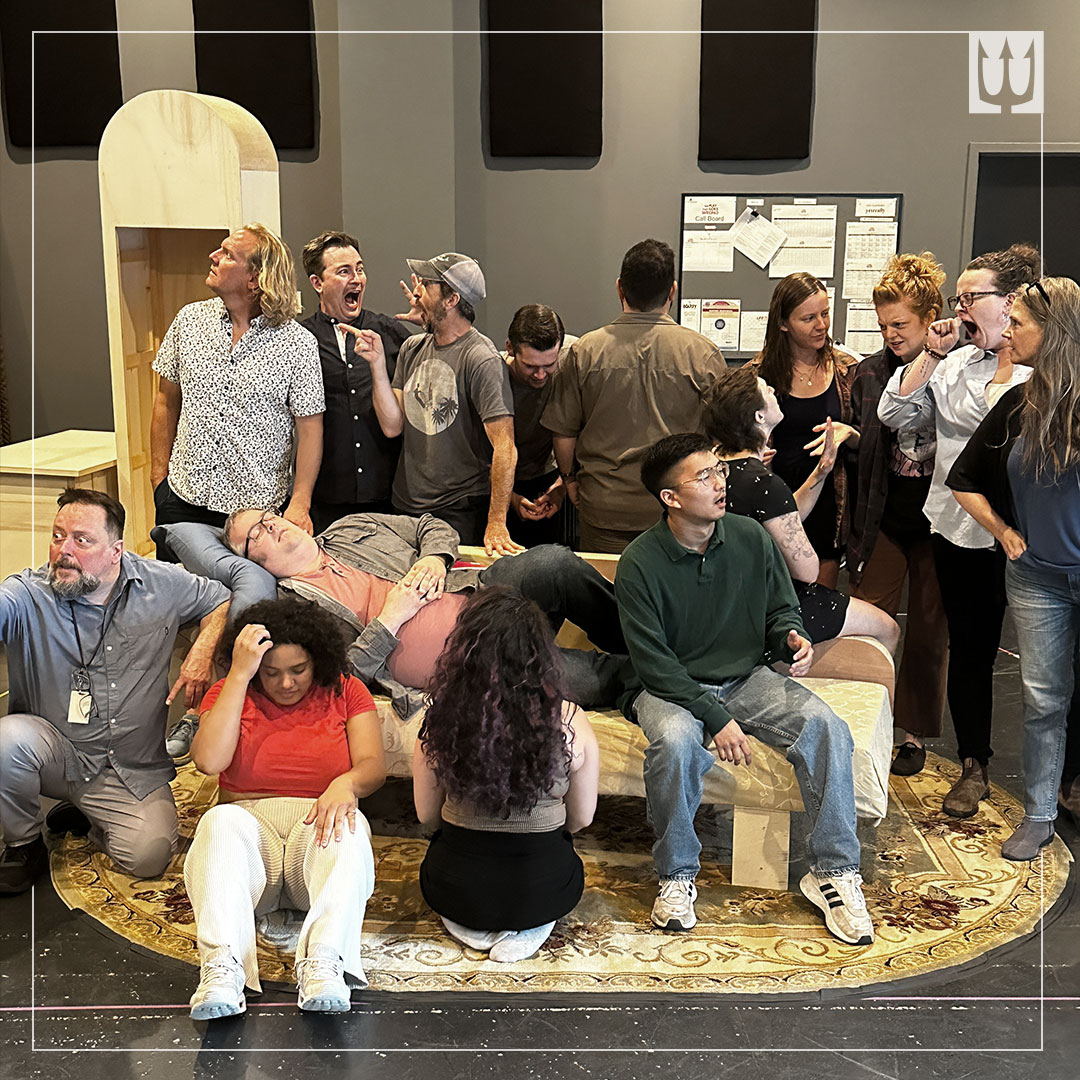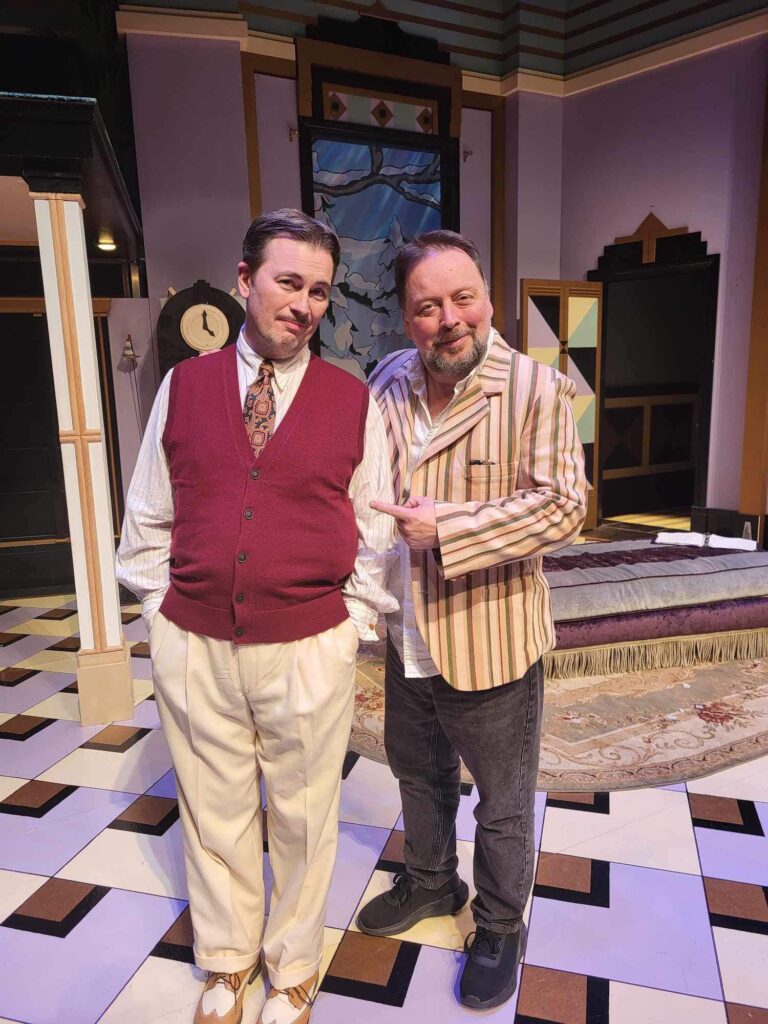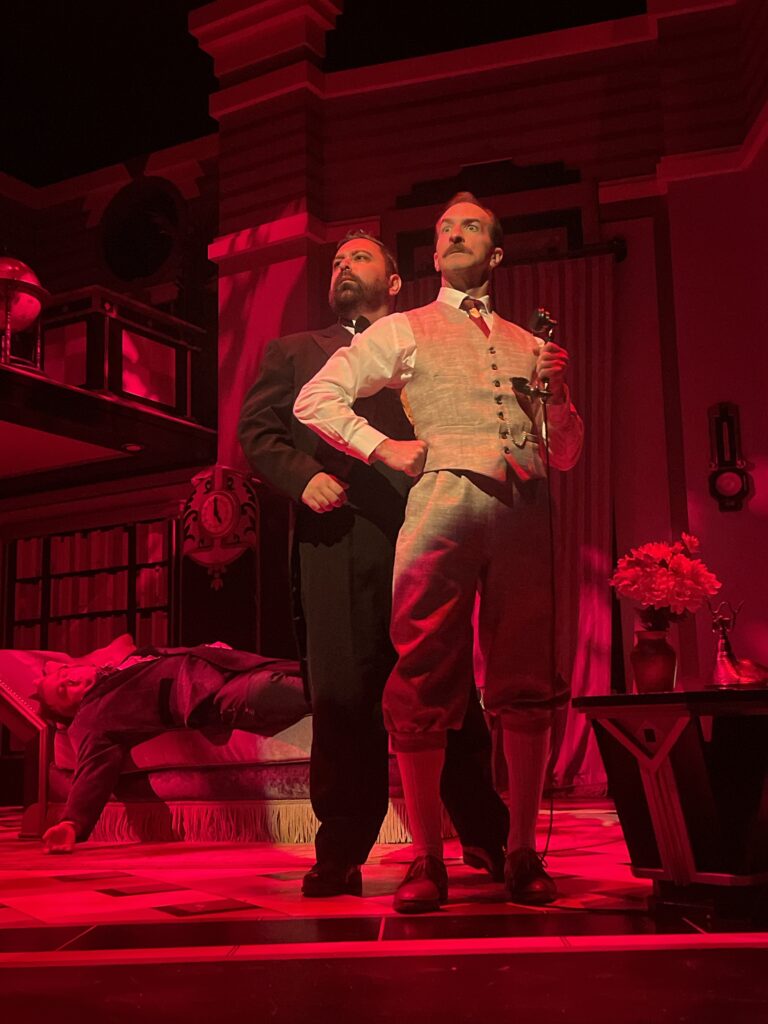
The Cast of The Play That Goes Wrong on their First Day of Rehearsal at Neptune Theatre
Neptune Theatre is kicking off its 61st Season with Henry Lewis, Jonathan Sayer, and Henry Shield’s Laurence Olivier winning The Play That Goes Wrong, which opens Friday September 29th, 2023 and runs until October 22nd. The play has been running in London since 2012, and is the longest-running play at The Duchess Theatre in the West End since that theatre opened in 1929. The Halifax cast features Jonathan Torrens, best known for his prolific roles on television in Street Cents (1989), Jonovision (1996), The Trailer Park Boys (2001), Mr. D. (2012) and LetterKenny (2016), among many others.
The ensemble cast also features several actors very familiar to Neptune audiences, and some making their Neptune debuts. I chatted with Josh MacDonald, who plays Max Bennett, last seen at Neptune in Lo (Or Dear Mr. Wells) and Shakespeare In Love, and Riel Reddick-Stevens, who plays Trevor Watson, who started taking classes at Neptune Theatre School when she was four years old and is making her Fountain Hall debut.
The conceit of The Play That Goes Wrong is that Max and Trevor are part of the Cornley Players Group, a community theatre that is putting on a production of The Murder of Haversham Manor. Josh MacDonald describes the play within the play as “a locked room mystery-drama in the Agatha Christie kind of mode. It is set in 1922 and it’s full of plummy declamatory dialogue and plot twists, and a pile-up of bodies.” Unfortunately, when the audience sees The Murder of Haversham Manor, as the title suggests, everything that could possibly go wrong goes wrong.
Unlike in a play like Noises Off where we see the drama both onstage and behind the scenes, and we get to know the actor characters and their personal shenanigans, in The Play That Goes Wrong the actor characters are trying their damndest to remain in character come Hell or High Water. Thus, as MacDonald stresses, “you’ll never hear the name Max in the play, because within the play within the play I play someone named Cecil, who is kind of a dandy, and a person named Arthur, the gardener.” Riel Reddick-Stevens plays Trevor, the “long suffering technician,” who is, in theory, a non-actor whose work with the Cornley Players is limited to behind the scenes.

Yet, as a real actor Josh MacDonald has had to create his own elaborate backstory about who Max is, because, as he says, “there’s an encouragement in the script to let a little of the cracks of who we really are shine through the play within the play. In my version of Max, I almost think that he has won a raffle or something, he is barely competent, and doesn’t deserve to be [on stage], but he’s just so enthusiastic. I like to imagine that he is the biggest fan of the Cornley Players Group. He loves them, he’s gone to see every show, he’s auditioned twenty times, he’s never been cast in anything, and then he got this sort of utility role as Arthur the gardener. However, someone who was supposed to play the romantic lead, Cecil, maybe has gotten sick, and I’ve had to kind of understudy in for that role at the last minute.” Conversely, Reddick-Stevens describes Trevor as someone who “really, really wants to do a good job, but gets distracted a lot, and loves live performance, but would much rather be on tour with Beyoncé or someone. They are stuck here as a volunteer for school or something, doing tech, and trying semi-hard to keep the company running, but they don’t quite have all the skills needed, nor the the attention span, to keep up with the company’s needs, especially now with their giant sets. Trevor doesn’t quite have the knowledge to keep all of that together.”
The gigantic looming set, by John Dinning, plays an adversarial role in the play. The Cornley Players got their biggest budget yet for The Murder at Haversham Manor, explains Reddick-Stevens, “so they spent all their money on the set.” “There’s a tensile strength I think we’re supposed to keep,” explains MacDonald, “like tell [the murder mystery] story, really tell that story so the audience can track it, but in a way The Play That Goes Wrong is about all the things that happen that get in our way of presenting that show to you: an exponentially escalating series of problems that take us to almost sort of cosmic levels of catastrophe. So, at a certain point maybe some of the stuff we are telling you about The Murder at Haversham Manor will be like sonic packing popcorn, you won’t necessarily be listening to our dialogue much because you will be watching what is occurring while we are saying that dialogue, while we’re trying to keep the set intact, trying to keep actors conscious and well,” he laughs, “things like that. “The show must go on,” adds Reddick-Stevens with a touch of playful irony.

While things may look chaotic onstage, of course, in real life, the Neptune Theatre players, must be careful to be meticulous in where and how they move, both for their own safety, and also to keep the cascading series of catastrophes escalating at the right time, place, and pace. “One of the things we talked about when we were going through the blocking is, in the script, usually, if you’re blocking a play you wouldn’t pay that much attention to stage directions, where in this play you have to because there are certain props that need to be here in order to trigger something else to happen. So, we had to pay specific attention so that everything is at the right place at the right time, and each actor is at the right place at the right time for each joke that is written to happen,” explains Reddick-Stevens. “[Director] Jeremy [Webb] was saying it’s not exactly a play to freestyle because you’ll discover that there’s a butterfly effect thing that will happen. These are all kind of cascading traps that we get ourselves into, and altering one piece of blocking might accidentally get us out of a trap, so we’ve had to kind of stay on the rails a bit with the blocking as written,” adds MacDonald.
As an Artistic Director Jeremy Webb has done an impeccable balancing act of bringing Nova Scotian actors who now live and primarily work elsewhere home for a show, while also casting many actors who live and work nearly exclusively in Nova Scotia in their Neptune debuts, while also bringing folks like Jonathan Torrens to Neptune for the very first time. Before he started rehearsals for this show Torrens had not been in a theatre production since Joseph and the Amazing Technicolour Dreamcoat at St. Patrick’s High School in Halifax in 1989. One thing that is obvious about Jeremy Webb as well is that he makes longterm connections and friendships with people, and he likes to maintain those working collaborations in new and different ways over the years. He and Torrens first met while working on the television drama Pit Pony, which was filmed in Cape Breton in 1999-2000, and they remained friends. Webb finally managed to lure Torrens back to his theatrical roots with this magical and ambitious production.
Torrens plays Chris Bean, the director of The Cornley Players, and also the Inspector in The Murder at Haversham Manor, sort of the Hercule Poirot or Miss Marple character. “He’s trying to direct us all, and act in it, so he’s trying to keep it all together,” says Reddick-Stevens.
On working with Torrens MacDonald says, “He is such a good team player, he is such a good, generous soul, and he is so sweet. [The play] is an ensemble piece, and Jonathan has come in and tackled it with such a happy heart. He has not been onstage since he was in High School, obviously he has tons of experience in front of audiences in all kinds of manners, but this is still something that he hasn’t done in a long, long time, but he is just outstanding.”
Riel Reddick-Stevens, on the other hand, literally grew up in this building. She started taking classes at Neptune Theatre School when she was four years old, and knew immediately that she wanted to grow up to be an actor. She took part in YPCo, doing both musicals and plays, and was in Neptune Theatre School’s first Prep Program. Since then she has gone to school at The National Theatre School of Canada in Montréal, and Randolph College in Toronto, where she is now based. “It’s been really cool and strange to be back here,” she says, “this is my first time being back in this building as an adult, and it’s so strange to be in the rooms that I was once in as a child, and to see how they’ve changed, and how I’ve changed, and… kind of see my growth all in one place at once. I think that’s really interesting for sure.”
For MacDonald who was last at Neptune in Lo (Or Dear Mr. Wells), which was quite a dark and serious piece, he says that there is something “really happy-making about being here. [The play] is just sort of a laughter-making machine, and I think in a very sincere way, it’s trying to give you a very joyous night at the theatre. In a way it’s just sort of play at its most happy.”
Adding an audience is the last piece of the puzzle, especially for MacDonald’s character Max, who finds the audience distracting. “It will pull his attention. I break the fourth wall a fair amount, and, even kind of as written in the parenthetical of the script, there are places where, should the audience really react to something than maybe Max will [react too]. It kind of winds up Max’s dynamo a little bit, and that might lead him into choices that sometimes bulge out the moment. I am swayed by [the audience’s] energy, and then, sometimes, the rest of my real colleagues onstage have to bring me back. What’s weird though, is that that’s not something we’ve been able to rehearse much, because we have no idea, an audience may or may not react to these things. I think of Max as almost an audience proxy: I just happen to be on the wrong side on the stage. I would be just as happy, and just as comfortable to be sitting in the middle of the house and enjoying the show. [As Max], I love this show, and I think it’s really neat and great. I just happen to be on the holodeck for some reason, wandering around and able to pick up the props and do all the things, but really I should be over there,” he laughs.
The carefully choreographed cascading catastrophes in The Play That Goes Wrong play at Neptune Theatre until October 22nd.
The Play That Goes Wrong plays at Neptune Theatre (1593 Argyle Street, Halifax) until October 22nd. Performances are Tuesday to Sunday at 7:30pm and Saturdays and Sundays at 2:00pm. Tickets are available online here or by calling the Box Office at 902.429.7070 or visiting in person at 1593 Argyle Street, Halifax.
Special Dates:
SUPPORT FOR CULTURE
INDUSTRY NIGHT:
Tuesday, October 3 – 7:30 pm
TALK BACK NIGHT:
Tuesday, October 10 – 7:30 pm
AUDIO DESCRIBED PERFORMANCE
Thursday, October 12 – 7:00 pm
MASKED PERFORMANCES:
Sunday, October 8 – 2:00 pm & 7:30 pm
Neptune Theatre is fully accessible for wheelchair users. For more Accessibility Information Click Here.






 World Theatre Day: My God Is It Ever The Time to Invest in Canadian Plays
World Theatre Day: My God Is It Ever The Time to Invest in Canadian Plays 

